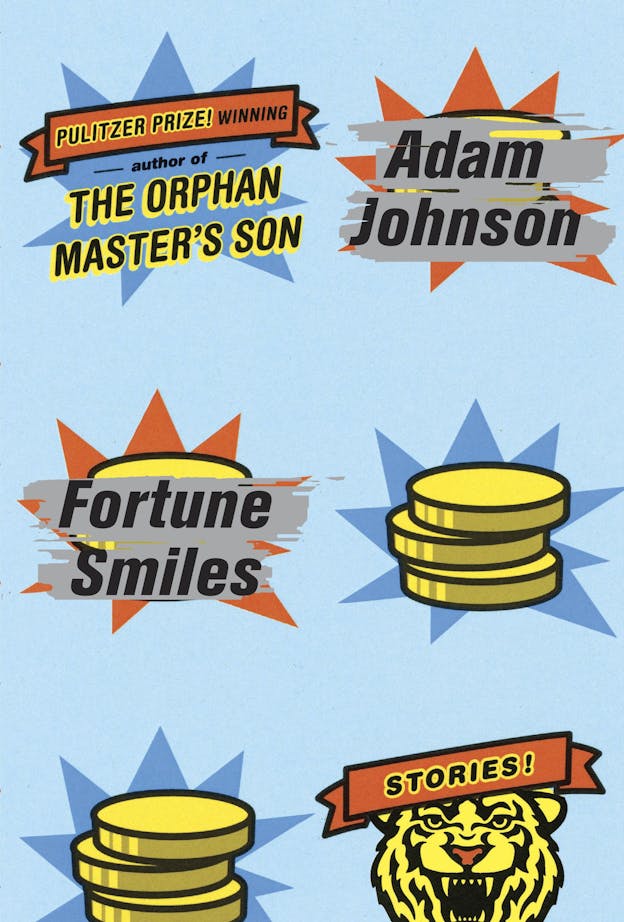Adam Johnson has long been interested in trauma. Best known for his 2013 novel, The Orphan Master’s Son, the Pulitzer Prize-winning author has written about North Korean gulags, apocalyptic epidemics, and future Americas where everyone must wear bulletproof vests at all times. He has even taught a writing class on trauma narrative, where he told his students that while traditional stories begin with a character’s desire, “the trauma narrative is the opposite.” Johnson said. “Instead of our hero moving toward achieving his desire, he’s evading what’s difficult to control,” he said. “He’s constantly escaping what he doesn’t want to deal with.”
His new short story collection, Fortune Smiles, similarly plumbs the depths of trauma-based decision making. But unlike The Orphan Master’s Son, in which we see the consequences of choice and circumstance tick along to their conclusions, the nature of the stories—short—means that we see only the characters’ hesitant first steps. What’s to come lives solely in our imagination. That’s not to say the stories are devoid of plot, but more than anything they come across as intensely magnified slices of life—peeks at a railway interchange where characters are set on a track to be good or bad for the rest of their lives, where they can choose to be absent fathers, pedophiles, jealous wives, or somehow find a new course to travel.

But while Johnson’s stories are set in trauma-laden scenarios like post-hurricane coastal Louisiana and post-communist East Berlin, Johnson never relies on the setting to draw readers in or to do the brunt of his character building. Instead, his characters openly confess their deepest flaws, calling on the reader to empathize rather than to judge. The former Stasi prison warden makes no effort to hide his past position, a man describes in excruciating detail how he views child pornography, and a woman who has had a double mastectomy announces, “I’m going to discuss the breasts of every woman who crosses my path.” Johnson’s narrators ferry readers across these depths with wry witticisms, pop cultural jokes, and a belief in humanity’s resilience.
Even as Johnson’s subject matter bends genre is a way that is assertively contemporary, much of his prose is classically beautiful. One depiction of North Korea in “Fortune Smiles,” the title story in which three defectors struggle to adjust to life in Seoul, describes “Gantry cranes frozen under fat white clouds; abandoned zinc carts crenellated with frost; rusted conveyor belts standing sentinel over garbage-glinting icebergs drifting south from Vladivostok.”
Johnson’s particular blend of cultural satire and melancholic prose, as well as his balance between the broadly historical and closely personal, is wholly original, but the influence of other contemporary writers is evident. The speculative fiction of Margaret Atwood and David Mitchell, which also trade in inherited traumas and personal resilience, come to mind, as do George Saunders’ darkly satiric visions of near-future America. But where Saunders’ stories take one poisonous aspect of society and play it out to its damning, inevitable endpoint, Johnson crafts a subtler web of personal choice and societal obsessions.
One such web stretches across the opening story, “Nirvana,” where a man is caught between a holographic version of the assassinated president—a man with form but no real mind—and his paralyzed wife—all mind, little body. Johnson’s language, in this stories and others, is also reminiscent of Saunders; Johnson frames real medical terms, foreign words, and baby slang in such a way that they seem plucked from a sci-fi novel. Plasmapheresis, Tamofixen, Volkspolizei, gla-gla: these words reflect the strangeness of our real world. Narrators speak conversationally, but their colloquial syntaxes are punctured by a slow drip of minor absurdity that presents real life slightly askew. In “Nirvana,” the narrator’s situation feels plucked out of science fiction but his fears and motivations are far more traditional: love, loss, and the unrelenting desire to change something over which you have absolutely no control.
The stories in Fortune Smiles daisy chain from one to another, with references to each other slipped in so that they operate in tandem, if not actually within the same universe. “Nirvana” shows up in “Dark Meadow”, “Dark Meadow” appears in “Interesting Facts”, and North Korea consistently haunts the background. But the stories are not connected only by intertextual in-jokes, but by a shared preoccupation with personal responsibility and whether a person's “fortune”—good or bad—is up to him or to the universe.
“This is all just temporary,” says a character in the post-Katrina “Hurricanes Anonymous.” He’s talking about the custody of his son, but the phrase hovers above the entire collection. The characters in Fortune Smiles desire a temporaneity they can’t quite grasp. They perch on the cusp of new lives and old nightmares, unsure whether forward motion is freedom or entrapment. It is all just temporary, but that doesn’t absolve anyone from the responsibility to act for the future.
Johnson presents the downsides to mankind without making them seem like a just punishment for humanity’s mistakes. “Once something bad happens, it happens every minute of your life, and it can’t be undone,” observes the narrator in “Dark Meadow.” “… The time to act isn’t after, it’s before, it’s now,” But Johnson’s stories are buoyed by a sense that there is always an after, for better or worse. After death, after trauma, after war. The question for Johnson’s characters—and for us—is what to do when after comes.
